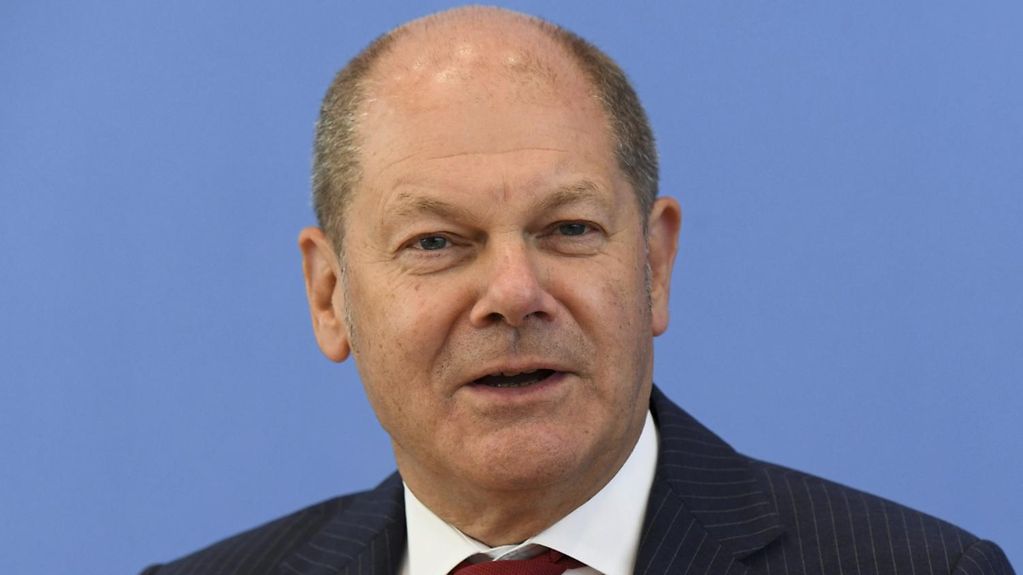Second supplementary budget for 2020
The German government is counting on its powerful, responsible financial policy. With its economic stimulus package it intends to lead the economy out of crisis and get it back on track. To finance all the assistance, the German government has earmarked additional funding in its second supplementary budget.
4 min reading time

Federal Finance Minister Olaf Scholz announced the second supplementary budget
Photo: picture alliance/AP Photo/Annegret Hilse
The German government will incur record debt of 218.5 billion euros this year. This is the result of the second supplementary budget for 2020, which the German government has now launched. Federal Finance Minister Olaf Scholz is calmly confident. "We can afford it, because we have kept our house in order." Germany, he said, has the strength to weather the crisis well.
Why does Germany need a second supplementary budget?
Now that we have managed to contain the pandemic, the next step must be to put Germany back on track for economic growth. Jobs and prosperity are to be underpinned in the long term. That means it is now important to revitalise the economy rapidly and equip it for the future. The German government has launched an Economic Stimulus and Future Technologies Package that will provide effective economic impetus, with a reduction in the rate of value added tax, a one-off per-child payment for families, and new assistance for small and medium businesses.
With the second supplementary budget for 2020, the German government is now laying the financial foundations for realising these agreed measures swiftly and decisively.
What about the first supplementary budget?
The German government has used massive force to contain the infection, strengthen the health system and offset the economic consequences. Back in March, the first supplementary budget put in place the foundations for swiftly financing measures to address the consequences of the pandemic. An additional 122.5 billion euros were earmarked.
What changes does this mean for the budget?
The second supplementary budget now complements the first supplementary budget which the German Bundestag adopted in March. In addition to the 122.5 billion euros covered by the first supplementary budget, the German government is now planning to increase spending by another 24.8 billion euros.
Taking the two supplementary budgets together, the total national budget for 2020 now provides for income and expenditure of 509.3 billion euros rather than the 362 billion originally planned. Investment spending will rise to 71.8 billion euros.
How much will Germany be borrowing?
Thanks to the sound financial policy the government has pursued in recent years, Germany now has the financial strength it needs to take decisive action and inject effective impetus into the economy. It is important for the country to swiftly overcome the impacts of the pandemic and to launch sustainable economic development. To finance the enormous tasks ahead, Germany will take out loans worth 218.5 billion euros this year. This will exceed the ceiling on debt by a long way – indeed by more than 118 billion euros, which is 62.8 billion euros more than the sum provided for in the first supplementary budget.
The German government believes this to be an exceptional emergency, which necessitates this action. It will be up to the majority of the members of the German Bundestag to decide whether the preconditions for this are met.
What will the economic stimulus package cost?
The German government has allowed for about 103 billion euros, to swiftly and decisively implement the economic stimulus package. The aim is to offset the social and economic consequences of the pandemic, to support families currently under particularly severe strain, and to provide swift impetus to get the economy back on track.
In detail:
- The reduction in value added tax for a limited period and the one-off per-child payment will put about 24 billion euros back in people’s pockets. That will restore their purchasing power and help the economy, although the state will see tax revenues drop.
- To underpin the existence of small and medium businesses, the German government is providing another 25 billion euros.
- To stabilise contributions, health funds and long-term nursing care insurance schemes are to receive a total of another 5.3 billion euros.
- In addition, 1.5 billion euros are earmarked for extending all-day schools and 500 million euros for expanding nursery schools.
- To ensure that the federal states and local authorities can invest and take action, they will receive support to compensate for the loss of company tax (6.1 billion euros) and to finance local public transport (2.5 billion euros).
How much cash is earmarked for the Future Technologies Package?
In the second supplementary budget the German government is providing targeted impetus to reinforce the innovative force of the German economy and ensure it is fit to face the future.
- The "Digital Infrastructure" special fund is to be granted an additional billion euros for the Digital Compact for Schools as well as significantly more cash to ensure the faster development of the country’s mobile communications infrastructure.
- The Energy and Climate Fund is to receive about 26 billion euros for climate action measures including mobility programmes, the hydrogen strategy and energy efficient building refurbishment. A sum of five billion euros will support the railway company Deutsche Bahn.
What else is to be funded?
The coronavirus pandemic has not only hit Germany. The impacts can be seen round the world. Germany takes its international responsibility seriously, and is providing about another two billion euros in development cooperation and humanitarian aid.